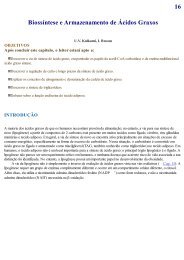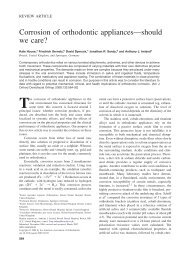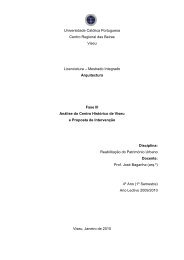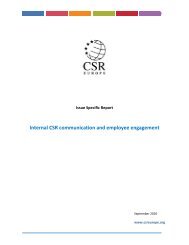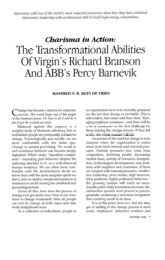Ethics in HCI - Molar
Ethics in HCI - Molar
Ethics in HCI - Molar
- TAGS
- ethics
- molar
- molar.crb.ucp.pt
Create successful ePaper yourself
Turn your PDF publications into a flip-book with our unique Google optimized e-Paper software.
exposed new <strong>in</strong>formation and flaws should be<br />
corrected to make all of the user <strong>in</strong>terfaces stronger.<br />
No: Because you have a valid work-around, practical<br />
expediencies should rule. Sometimes good ideas or<br />
critical <strong>in</strong>formation come too late.<br />
Chauncey Wilson<br />
Dilemma 1: You are a manager of a <strong>HCI</strong> group at a major<br />
software company. Your latest product is almost through<br />
the beta process and is gett<strong>in</strong>g good reviews. At the very<br />
last customer visit, a potential scalability problem is<br />
observed. Later, <strong>in</strong> discussions with a trusted technical<br />
source, you come to believe that this scalability issue<br />
(which is not related to the UI work that your team has<br />
done) could have catastrophic consequences for large (but<br />
not small or medium) customers. The next day is sign-off<br />
for the product and everyone's large bonus depends on a<br />
unanimous sign-off that day. The director of the project<br />
goes around the room ask<strong>in</strong>g each manager if the product is<br />
ready and they all reply “YES”. Then it is your turn. You<br />
stand to lose a $10,000 bonus. Do you br<strong>in</strong>g up the<br />
potential defect and ask for a delay <strong>in</strong> the product until<br />
you confirm your suspicions?<br />
Yes: You don't deserve a bonus for shipp<strong>in</strong>g an unusable<br />
product. This sort of <strong>in</strong>centive is <strong>in</strong>herently unethical<br />
for exactly this reason – it’s a conflict of <strong>in</strong>terest.<br />
No: The product defect is not of your mak<strong>in</strong>g and you<br />
will not be blamed for it when large customers start<br />
compla<strong>in</strong><strong>in</strong>g loudly. The company will fix the<br />
problem <strong>in</strong> the future. The company philosophy is<br />
that time-to-market is more important than last<br />
m<strong>in</strong>ute flaws that will hurt revenues. The company<br />
has survived similar problems <strong>in</strong> the past.<br />
Rolf Molich<br />
Dilemma 1: In a press <strong>in</strong>terview about the usability of<br />
bank websites a usability expert strongly criticizes the<br />
user <strong>in</strong>terface of the website of a certa<strong>in</strong> bank. Among<br />
other th<strong>in</strong>gs he states that the website conta<strong>in</strong>s features<br />
that are otherwise “only found <strong>in</strong> porn websites”. The<br />
expert later confesses off-the-record that his critical<br />
remarks were based solely on his personal op<strong>in</strong>ions, not on<br />
usability tests. Is this behavior ethical?<br />
Yes. The fact that the remarks are based on op<strong>in</strong>ion<br />
<strong>in</strong>stead of usability test<strong>in</strong>g isn’t relevant. In this field,<br />
we are often asked to make judgments without hav<strong>in</strong>g<br />
collected any empirical data.<br />
No. The comparison is <strong>in</strong>tended to embarrass the bank<br />
while mak<strong>in</strong>g the usability expert seem witty and hip.<br />
It is a lack of professionalism and evidence of the<br />
person’s immaturity. Serious attacks on the usability<br />
of other people’s work should be based on users’<br />
f<strong>in</strong>d<strong>in</strong>gs. The usability expert reduces <strong>HCI</strong> to an<br />
op<strong>in</strong>ion war where the person with the hippest and<br />
most loudly voiced op<strong>in</strong>ions w<strong>in</strong>s.<br />
Dilemma 2: Your startup company is usability test<strong>in</strong>g<br />
onl<strong>in</strong>e versions of several compet<strong>in</strong>g e-commerce<br />
bookstores to gather usability data for your own website.<br />
To make the tests as realistic as possible, you want to ask<br />
test participants to place real orders on the website us<strong>in</strong>g<br />
their own credit card. Provided that you reimburse test<br />
participants <strong>in</strong> full for all their expenses, is it ok to ask<br />
them to reveal <strong>in</strong>formation about their credit card?<br />
Yes. We really need the diversity of the data that will<br />
result from us<strong>in</strong>g diversified credit cards and<br />
diversified personal addresses. We also need to test<br />
complete, realistic sales. There’s noth<strong>in</strong>g secret about<br />
a credit card number. You can publish your credit<br />
card number on the front page of the New York<br />
Times, if you wish. Inform the test participant well<br />
before the test that s/he will be us<strong>in</strong>g his/her own<br />
credit card and excuse them immediately if they<br />
hesitate.<br />
No. The facilitator must ask the test participant to use<br />
the facilitator’s credit card or stop the test when the<br />
website asks for credit card <strong>in</strong>formation. The real<br />
issue isn't budget<strong>in</strong>g and reimbursement – it’s privacy<br />
and potential legal exposure. Th<strong>in</strong>k about it... the<br />
users will be com<strong>in</strong>g to an unknown company, and<br />
then a nice lady asks them to disclose their credit card<br />
number while she takes copious notes. Sounds like a<br />
scam to me!<br />
PANELIST DETAILS<br />
Brenda Laurel is a member of the Graduate Faculty, Media<br />
Design Program, Art Center College of Design. Brenda is a<br />
usability expert specializ<strong>in</strong>g <strong>in</strong> <strong>in</strong>teractive enterta<strong>in</strong>ment for<br />
the last 25 years. She is best known as co-founder and<br />
chief designer of Purple Moon, a company formed to<br />
develop <strong>in</strong>teractive products for girls. Purple Moon arose<br />
from Laurel's work at Interval Research Corporation,<br />
where she coord<strong>in</strong>ated research activities explor<strong>in</strong>g gender,<br />
culture and technology. Laurel is the editor of “The Art of<br />
Human-Computer Interface Design,” and author of<br />
“Computers as Theatre” and numerous other sem<strong>in</strong>al<br />
CHI2001 Panel Proposal Page 5 <strong>Ethics</strong> <strong>in</strong> <strong>HCI</strong>




